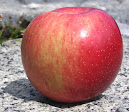FRIEND OR FAUX?
 |
I approach this tasting with the knowledge that my sample is not the legendary English cider apple, Foxwhelp.
Today's is a different apple that was confused with the real thing in North America decades ago.
Still, this is a cultivated variety, worth tasting. I assume it resembles the true Foxwhelp.
Mine is round with some flattening at top and bottom and just a little conical taper. It is hefty with almost no ribbing, a light spring green with a streaky red blush.
Many small light lenticel dots are especially visible in the blush but easy to spot everywhere. Its calyx is closed.
It's quite attractive, really.
Brace for the taste
The balancing tartness gives it a little zing that is nice.
 This is...not what I expected, even from a false Foxwhelp. How could this mild
and agreeable apple be confused with a classic bittersharp?
This is...not what I expected, even from a false Foxwhelp. How could this mild
and agreeable apple be confused with a classic bittersharp?
As Maine-based Out On a Limb Apples put it in 2016,
This mislabeled apple has caused a mystery among cider growers who thought they were growing an astringent bittersweet [sic].
Instead the trees grafted in the US produce a tasty, fresh eating apple that no one can identify.
That is clearly what I've got here.
Scott Farm, a Vermont orchard that absolutely knows its apples, believes it grows the true version "as none of us care to eat it out of hand."
The orchard has a photo of its Foxwhelp on its website (link above) that looks a good deal like mine. If Scott has the real thing, perhaps what I've got is a lookalike that is not a tastealike.
The cider thickens
Pomiferous has a detailed description of Foxwhelp, and some American growers describe an apple that is clearly not mine and, visually anyway, not a lot like Scott's.
Scott did not say why no one there "cares to eat it out of hand." Maybe it's that unruly true bittersharp, or maybe it's just a bit boring (like mine).
There is a long-running discussion of the issue on an orchardist website, the Holistic Orchard Network. A note last summer says that a true English Foxwhelp is becoming available in the States.
That is, Foxwhelp budwood. Apples to follow, in a few years!

Comments
Post a Comment
Join the conversation! We'd love to know what you think.